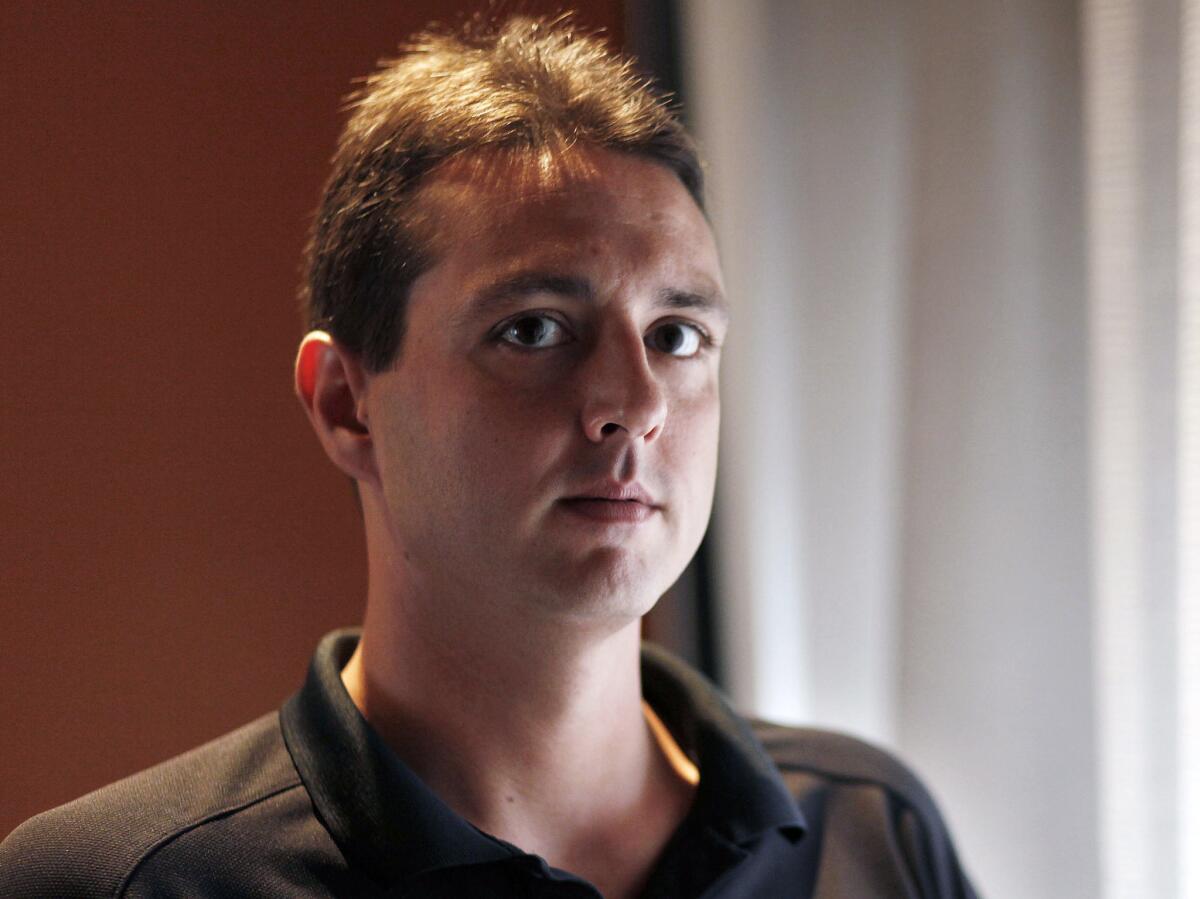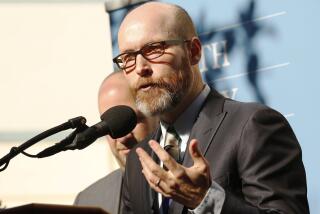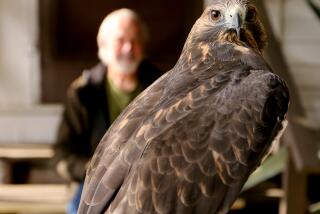Wounded Warrior veterans aid group fires executives over lavish spending

Steve Nardizzi, former CEO of the Wounded Warriors Project, is seen in July 2009.
Steve Nardizzi’s aggressive, entrepreneurial approach to charity work transformed the Wounded Warrior Project from a shoestring effort to provide underwear and CD players to hospitalized soldiers into an $800-million fundraising enterprise. It also led to his downfall.
A lawyer by training who never served in the military, Nardizzi traded a career in the courts for one helping wounded veterans. He spent nearly a decade at the United Spinal Assn. before coming to the Wounded Warrior Project in 2006 with a corporate leadership style that catapulted the organization to the top ranks of U.S. charities.
That success led to lavish spending — the group’s annual staff meeting in 2014 cost $970,000 — prompting complaints from employees, veterans and charity watchdogs about profiteering off veterans that emerged in reports by the New York Times and CBS News in January.
MORE: Get our best stories in your Facebook feed >>
On Thursday, Nardizzi and Chief Operating Officer Al Giordano were fired, their board of directors said, as the organization cracks down on employee expenses and strengthening controls that have not kept pace with the group’s rapid growth.
The Wounded Warrior Project’s directors hired outside legal counsel and forensic accounting consultants to conduct an independent review of the Jacksonville, Fla.-based organization’s records and interview current and former employees, according to a statement released late Thursday by a crisis management firm.
The reports by CBS and the New York Times described extravagant parties and last-minute, business-class air travel. One former employee compared it to “what the military calls fraud, waste and abuse.”
The group’s 2014 meeting, at a five-star hotel where Nardizzi rappelled from a tower into a crowd of employees, was particularly costly. The public relations firm, Abernathy MacGregor, said “such events will be curtailed in the future.”
Nardizzi, who did not respond Friday to requests from the Associated Press for comment, defended such spending while still in charge of the charity. “An entrepreneurial spirit led to WWP’s success,” Nardizzi wrote Jan. 18 on his Facebook page.
“If nonprofits are going to be effective in their world-changing work (eliminating disease or eradicating poverty), they must be allowed to research, to advertise, and, most important, to fail — in the same way that corporations like Apple and Nike do. We need to embrace the notion that has long guided the for-profit world: think big, and often spend big, in order to succeed big,” Nardizzi wrote.
Nardizzi certainly thought big. According to the Internal Revenue Service, the charity took in $800 million over the last six years, while also paying some of the highest salaries, to many more people, than other major nonprofits. Nardizzi earned $496,415 annually and Giordano $397,329, while at least 10 others took in more than $160,000 each for the fiscal year ending in September 2014.
Compensation accounted for $32 million, or 13%, of the group’s $248 million in spending that year.
Other details that appear in the nonprofit’s IRS Form 990 filings also raise questions. The group has built up reserves worth $248 million, mainly held in investments. Charity watchdogs say it’s OK to keep a rainy-day fund, but the money should go as much as possible to the mission.
Nardizzi’s leadership drew fans, including Tom Keller, a communications consultant who worked on WWP projects. He described Nardizzi as a “Powerhouse CEO” and a “superb leader” in a 2014 recommendation on LinkedIn.
Reached by phone on Friday, Keller said he no longer feels the same way.
“I have associations with other veterans organizations, and I just feel sick about the whole situation,” Keller said. “My involvement with [Wounded Warrior Project] didn’t last long after he came aboard. I know the truth will come out.”
Donors and veterans also reacted strongly, including some who described themselves as monthly donors. The nonprofit’s Facebook page was filled with angry comments by people rethinking whether they should donate again.
WWP said in response to the posts that it was proud of its programs and stood behind its fundraising.
The group’s statement Thursday said its most recent audited financial statement showed that 81% of donations were spent on “programming,” not fundraising. The statement cited a “joint allocation” accounting rule that enables nonprofits to classify fundraising as a service to clients if the event or material also is “educational” and includes a “call to action” beyond simply appealing for money.
Invoking that rule, the nonprofit reported to the IRS that it spent $26 million, about 10% of its budget, on conferences and events between Oct. 1, 2013 and Sept. 30, 2014. The statement said about 94% of the “was associated with program services delivered to Wounded Warriors and their families.”
The IRS filings said that almost $190 million, or 76% of the budget, went to veterans programs — a share that charity watchdogs would consider respectable. However, almost $41 million of that programming amount was claimed as the “educational” component of fundraising requests; without it, programming accounted for only 60% of the budget. Charitywatch.org says its analysis concluded that Wounded Warriors spent just 54% on programs rather than overhead, giving it a “C” rating.
Board Chairman Anthony Odierno will oversee the charity on an interim basis.
Calls and messages sent to Nardizzi were not answered Thursday, and a message the AP left at Giordano’s home was not returned.
“It is now time to put the organization’s focus directly back on the men and women who have so bravely fought for our country and who need our support,” Odierno said in the statement.
The organization was started in 2003 by John Melia, a former Marine who was injured in a helicopter crash in Somalia. He said Friday that he was open to returning and restoring the group’s reputation now that two executives who replaced him have been fired.
He said donors who supported the group since its humble beginnings “have every right to be angry about the lack of stewardship shown by the immediate past leadership of WWP,” and “the new leadership of the WWP must do everything in its power to restore its relationship and regain the trust of those it serves and its donors.”
ALSO
President Trump? Who’s with him and who’s against him
How the 1981 assassination attempt changed Nancy Reagan
Central American immigrants, wary of recent raids sweeping up young people, adjust to a life of fear
More to Read
Start your day right
Sign up for Essential California for news, features and recommendations from the L.A. Times and beyond in your inbox six days a week.
You may occasionally receive promotional content from the Los Angeles Times.






